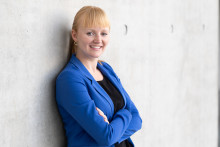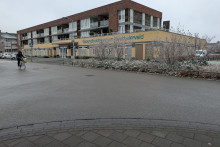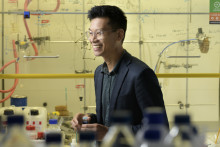Lisa nieth
Lisa Nieth conducted her doctoral research within Kennispunt Twente as an external PhD candidate at the University of Twente. Her PhD thesis, titled ‘It takes two sides to build a bridge- Universities as institutional entrepreneurs in knowledge based regional development’, represents the first PhD thesis within Kennispunt Twente. Her work was part of the European project RUNIN (Role of Universities in Innovation and Regional Development), which aims to train PhD researchers on how universities contribute to innovation and economic growth in their regions.
What was the main goal of your research?
Nieth: ‘I wanted to investigate the role of universities in regional development. I focused on how universities can contribute to regional coalitions and what challenges they face when contributing to such partnerships. I studied three universities and their respective regions: University of Twente, Aalborg University in Denmark and University of Aveiro in Portugal.’
What were your main findings? How can universities become more effective in their contributions to their regions?
‘What we cannot forget is that universities are very complex organizations. It is not only one person or department that decides what the university does. My research showed that we mainly need alignment within the university and with the external coalition partners as well as a common knowledge base. If you don’t have that, the contribution to the regional coalition can become ineffective. For instance, the president of the university’s executive board or the rector might be member of a regional board, which decides on regional projects and strategies. However, it will be professors and academics that will need to be involved in these projects on behalf of the university.’
Does that mean that academics should be involved in the Twente Board, for example?
‘That is an option. But most importantly, academics need to know that regional projects and engagement can be a priority. The top management needs to show their support, so that academics can prioritize their engagement in regional projects, knowing that they officially have time and resources for this work. Otherwise it can be difficult to get involved, because there are so many demands on researchers these days: they need to firstly, educate and research, but also to publish in high-ranking journals, collaborate internationally, engage with well-known companies and so on.’
How is the UT doing in this regard? Is there something the UT is doing completely differently than other universities?
‘In all three regions I studied I found examples the others could learn from. For example, in Denmark students are a lot more involved in regional development due to the problem-based learning approach. This is something the UT could prioritize even more. On the other hand, in Twente the university and the region are well aligned if it comes to priorities: they both focus on high-tech. Thus, they have a starting point for a common knowledge base and now they need to find ways to better apply it and make this goal approachable to all regional partners.’
How could they achieve that?
‘They should pull in other actors, such as small and medium sized companies or rural municipalities that might feel ‘high tech’ is not for them. But high tech isn’t just elaborate robots, it has many forms. The second issue is the internal alignment. At the UT, there are no internal processes that really allow people to be regionally engaged. If academics get involved, it’s usually because of their personal interests and connections, not because they are doing it ‘for’ the university. There is a mismatch here. If academics know they can and should work on regional projects, it will empower the UT as a whole.’
How will your PhD research be used? Will the universities take it on board?
‘The Twente region knows about my findings as they are my employer. I have received interest mostly from regional actors, such as the municipality and province. So far I haven’t been contacted by the UT, but – of course – I am open to share and apply my knowledge at the university as well.’







